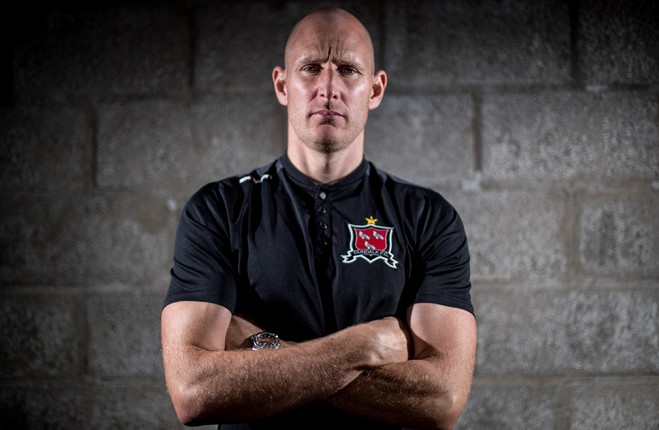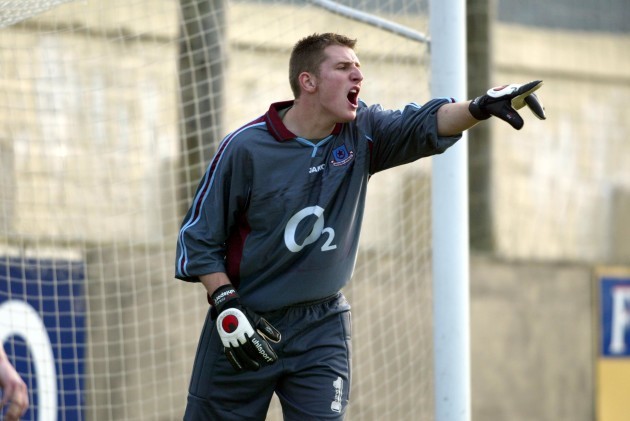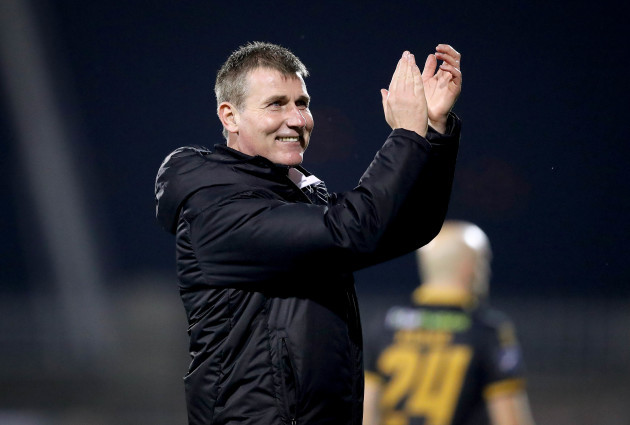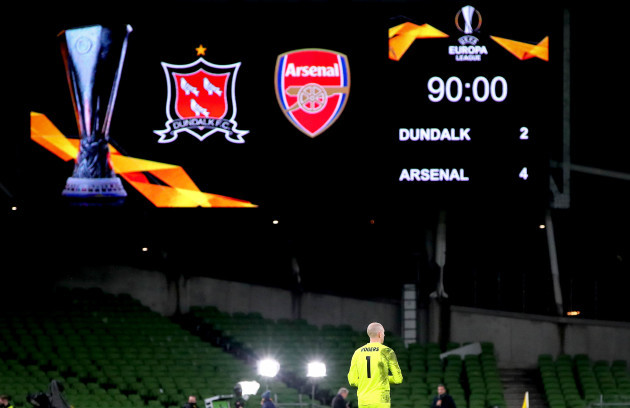LAST UPDATE | 10 Jan 2021
WHEN IT COMES to League of Ireland players, it’s hard to think of many, past or present, who have had as successful or distinguished a career as Gary Rogers.
After playing his final game last month — the concluding match of Dundalk’s Europa League campaign against Arsenal — he announced his retirement.
Only one player, Waterford and Limerick legend Al Finucane, made more appearances than Rogers in League of Ireland history.
And the Navan native can look back on his career with great satisfaction — five Premier Division titles and five FAI Cup triumphs are among his many accolades.
Rogers’ decision to retire, after more than 20 years playing in the League of Ireland, was confirmed last month, and it was not an easy call to make even at the age of 39.
“Playing football professionally, it’s a brilliant job,” he tells The42. “It’s the best job in the world in some regards and it can be the best-paid job depending on where you’re playing, but obviously, not in our country.
“It’s always difficult to step away. We had a decent year in the Europa League and winning the FA Cup, so I felt the time was right off the back of the FAI Cup win. It’s something I considered and talked about throughout the year. I spoke to a few people close to me about it.
“I’m 39 years of age, I’ve a young family and the real world is calling. Whether I played for another two years, there was that possibility. It’s nice being able to go when you may have more to give. People might say I was finished anyway, but I felt the time was right.”
Given all he achieved, retiring as one of the most successful domestic-based players ever, it’s amazing to think Rogers could so easily have slipped through the cracks.
As a youngster, the accomplished goalkeeper — who this week was confirmed as part of the Monaghan footballers’ backroom team — admits his preference was GAA rather than soccer.
The area he grew up in was a Gaelic football stronghold, while previous generations of his family had excelled in the sport. Rogers had a talent for it too, impressing as a centre forward, and combined it with soccer before opting to go down the professional route in the latter.
Moreover, the early days of his career did not necessarily suggest he would retire as one of the League of Ireland’s most successful players — Rogers was 31 by the time he won his first Premier Division title.
He joined Shelbourne in 1999, but failed to establish himself in the first team amid an era when the Tolka Park outfit were widely regarded as the best team in the country.
“I was the third-choice keeper,” he recalls. “It was the double-winning team. You just knew if something happened to [the regular number one] Steve Williams, Dermot [Keely] wasn’t going to throw a young kid into goal, he was going to sign a ‘keeper on loan or bring somebody in.”
Early on in his career, Rogers also went on trial at Stockport County, but the English club baulked at the asking price and so a spell in Britain never materialised, which was perhaps a blessing in disguise when you consider how things ultimately panned out.
The Meath-born stopper got his earliest taste of first-team action on loan at St Francis, before joining another First Division side, Drogheda United, permanently.
The young goalkeeper helped the Drogs win promotion, as well as the FAI Cup in 2005, but departed for Dublin City after losing his first-team spot.
Yet not long after joining the Northside-based club, they went bust.
“Those realities are never far away unfortunately as a League of Ireland player,” he says. “It happened to a number of clubs during my time in the league. It’s one of those scenarios that you don’t like seeing happen. But unfortunately, the game isn’t supported as well as you would like in terms of sponsorship. That’s not having a go at the current sponsorship, but investment is not what it should be and unfortunately, that’s just the way it is. It certainly needs redevelopment and reinvestment in order to thrive. Unfortunately Dublin City, Monaghan and other teams along the way paid the price.”
Partly as a result of these limitations, Rogers went back to playing GAA around this period and admits he could so easily have left soccer behind entirely were it not for a fateful call from then-Galway boss Tony Cousins.
“I remember meeting [Tony] in the county club in Dunshaughlin. It was two weeks before the season started, they were going away to Spain on a pre-season camp.
“I was going to go the route of back to GAA. I was 27 at that stage. That year, we played the club championship. I was back playing a little bit. Coyler [Colm Coyle] brought me in on the senior [Meath] panel and I played the first two league games. Then the opportunity to go back and play full-time football with Galway came. It was a lifestyle thing. You put serious commitment into playing GAA as well, but you’ve got to work on top of it.
“The opportunity to go back and play full-time football with Galway was one I couldn’t turn down and it was a turning point in terms of my career.”
Rogers agrees when it’s suggested that the call from Cousins was a pivotal moment – perhaps it was even the difference between having a relatively forgettable League of Ireland career and an iconic one.
Shortly thereafter, having impressed at Galway, he signed for St Pat’s, with whom he made his first of 54 European appearances overall in his career, which is a record for a League of Ireland player.
And even greater success was around the corner. After joining Sligo Rovers in 2012, Rogers was an ever-present as he helped the club win their first league title in 35 years.
Yet he undeniably saved the best until last. Dundalk had already won one league title under current Ireland boss Stephen Kenny when he joined, but Rogers would be integral to a further four in six seasons during his stint at the club, replacing the departed Peter Cherrie as the club’s regular number one.
“Stephen brought me in and really challenged me,” he recalls. “He probably helped me, I won’t say change, but to improve myself and drive me to get more out of my career. He gives players confidence to challenge themselves to be better. He was a huge help to me and if you speak to any of the players that were there, they will probably say similar things.”
And despite all the domestic glory, the pinnacle was undoubtedly the two qualifications for the Europa League group stages, where Rogers and co pitted their wits against clubs whose resources invariably dwarfed their own.
“It’s brilliant to be playing in that environment. Obviously, 2016 was probably better than last year, because of the fact that you had supporters and it’s the first time you did it. It was still brilliant to be involved last year as well, don’t get me wrong. Playing the likes of Arsenal and stuff like that, and playing well.
“But in 2016, we gave ourselves a real good chance of getting out of the group, so it was brilliant times. It’s hard to single out moments over the last six years, there have been so many fortunately, and that was certainly up there.”
Rogers impressed with the Lilywhites to the extent that he was called up to Martin O’Neill’s Ireland squad in 2016 on two occasions.
“I really enjoyed it and I suppose the most pleasing thing is to go in and do well and then obviously get called back in again. But for the amount of fixtures we had, I was due to get called into other squads, but it didn’t materialise. That opportunity faded away as quick as it came about. But having said that, it was still a hugely proud moment to be brought in. Unfortunately, I didn’t pick up a cap, but I was still fairly pleased to have been there.”
Despite the FAI Cup triumph and the creditable displays in Europe, there has been a sense of late that Dundalk are not quite the formidable force they once were. 2020 was certainly a turbulent season, with Kenny’s successor Vinny Perth relieved of his managerial duties early on in the campaign and the little-known Italian Filippo Giovagnoli replacing him.
Surrendering the title to main rivals Shamrock Rovers was perhaps the hardest pill to swallow amid a strange campaign that saw them finish third.
“It’s not what we wanted it to be, there’s no getting away from it,” Rogers says. “But having said that, it was an 18-game season and after a little blip in the middle of it, the league ran away from us pretty quickly. It was always going to be hard to come back and gain that ground that we had lost.
“The previous year, we were 13 points behind, but we had 20 odd games to go and got ourselves back in and won the league. We won it in September and went on a record run. But that opportunity to have a run like that wasn’t there this year, and that’s the way it goes.
“I think we showed what we were made of [ultimately] in terms of qualifying for the group stages of the Europa League, and winning the cup as well.”
Nonetheless, in addition to Rogers, a number of other important and experienced players such as Dane Massey, John Mountney, Sean Gannon and Sean Hoare have left in the close season, with the latter two joining their biggest rivals, Shamrock Rovers. And partly as a result of these changes, Rogers suggests the Hoops will be favourites for the title in the coming season.
“They have maintained a lot of their squad,” he explains. “I know Jack Byrne is gone, but there’s a higher turnover of players at Dundalk this year, more so than there would have been in previous years. So pre-season will be interesting to see how they go and how the season goes. It’ll be very important to get off to a good start. It’ll be very important for the new players to bed in quickly, because you would expect Shamrock Rovers to continue the momentum that they’ve built up.”
Perhaps inevitably, given that it’s the League of Ireland, and Rogers’ career has encompassed plenty of low points as well as highs, our conversation concludes on the seemingly evergreen topic of Irish football’s grave problems and how they can potentially be solved.
Rogers is certainly better placed than most to comment, having served as PFAI Chairman and been at the centre of negotiations over the league’s re-start earlier this year. He tweeted (see below) earlier this month lamenting the status quo and elaborated when questioned on these thoughts.
Hugely worrying times for Loi,
— gary rogers (@1garyrogers) January 3, 2021
Unofficial start date moved a week before preseason to be replaced by another unconfirmed start date.
Fixtures ❌
League sponsor ❌
Government funding ❌
Watch Loi 🤷♂️
TV deal ❌
Prizemoney 🤲
Fans/season ticket holders ❌
No such issues in the NIFL
“The stuff I would have put out there this week, they are facts really. I love the League of Ireland, it’s been great to me. But I would like to see it flourish. I’m disappointed with the way it’s been run over a number of years. There hasn’t really been any progress or investment in clubs all over the country from the governing body, which is a disappointing aspect of being in the league for 20 years.
“Rovers have done great work developing their ground over the years, but they’ve done that themselves and it’s been co-funded by community projects.
“Whereas you look at the likes of United Park and Oriel Park, there’s been zero investment from government and governing bodies. I think our league is certainly, when it comes to fundraising, well down the pecking order. That goes from government to governing bodies. So it’s definitely been under-supported and it’s in need of massive investment, whether it’s government, sponsorship or TV deals.
“It’s difficult to see massive changes in the current environment. I think it’s more about survival than a complete overhaul and revamp. It’s worrying, it genuinely is.
“The league date [for the season's commencement] was supposed to be 26 February or something like that. That hadn’t even been given out to the clubs officially. There’s no fixture list. Now, the date has been moved, but it’s not a concrete date either.
“It’s very difficult for clubs. If I’m a club manager and I’m trying to prepare a professional club to go and play in the domestic league and compete in Europe, and I’ve no start date and I’ve no fixture list, you don’t just turn up on a Saturday and go out and play. A huge effort goes into it and there are huge [numbers of] staff involved in each club.
“You look at the strength and conditioning coaches and sports scientists, lads that invest seriously in their teams and their players. It’s to their detriment when they’re leaving things to the last minute and there’s very poor communication around it. It’s not acceptable really.”




